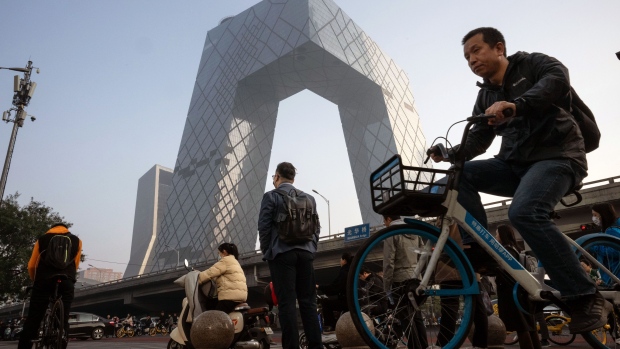Jan 28, 2024
China to Merge Three Bad-Debt Managers Into CIC, Xinhua Says
, Bloomberg News

(Bloomberg) -- China’s official Xinhua News Agency deleted a report saying that Beijing plans to “merge” three of its biggest bad debt managers into China Investment Corp.
The short report published on Sunday stated without elaborating that China Cinda Asset Management Co., China Orient Asset Management Co. and China Great Wall Asset Management Co. would be “merged” into the country’s $1.24 trillion sovereign wealth fund. The move would be part of China’s plan to reform institutions, according to the report.
Bloomberg News reported in May last year that China was considering transferring the state’s stakes in the three bad debt managers to Central Huijin Investment Ltd., a unit of CIC.
The Ministry of Finance holds a controlling stake in the three, with 58% in Cinda, 71.6% in Orient and 73.5% in Great Wall, according to their latest available annual reports.
CIC and the ministry didn’t immediately reply to requests for comment.
While the move will allow Beijing to separate the government’s roles as a regulator and shareholder in order to better focus on curbing risks, the transfers could raise questions over the strength of direct government support. Concerns over reduced government support for the AMCs had just led to a downgrade by Fitch Ratings Ltd. earlier this month.
Katie Chen, a senior director at Fitch, said the AMCs’ current ownership structure and lengthy government approval processes could adversely affect the timeliness of required support or resolution.
“Any change of ownership structure that streamlines the capital support process and improves timeliness could be positive to the AMCs’ ratings, if they prove effective,” said Chen. “We believe the Chinese government is, and will continue to be the ultimate support provider to the AMCs in the event of need.”
The report gave a brief lift to the firms’ bonds and shares on Monday. Cinda’s shares jumped as much as 7.8%, before paring gains to 3.9% in morning trading in Hong Kong.
Central Huijin has long been the primary vehicle for holding the state’s stake in many of the country’s largest financial institutions. It has direct ownership in 19 financial institutions as of end-June, according to its website.
China Huarong Asset Management Co., once the biggest among so-called AMCs, is not part of the transfers after a government-orchestrated bailout in 2021 that saw Citic Group become its largest shareholder. Huarong roiled Asian credit markets in 2021 as it failed to release its annual report on time, eventually revealing a massive loss for 2020.
China created Cinda, Great Wall, Orient and Huarong to buy bad loans from banks in the aftermath of the late 1990s Asian financial crisis, when decades of government-directed lending to state companies had left China’s biggest lenders on the brink of insolvency. The firms later expanded beyond their original mandate, creating a labyrinth of subsidiaries to engage in other financial businesses, including shadow lending.
--With assistance from Zhang Dingmin, Jing Zhao and Qingqi She.
©2024 Bloomberg L.P.






